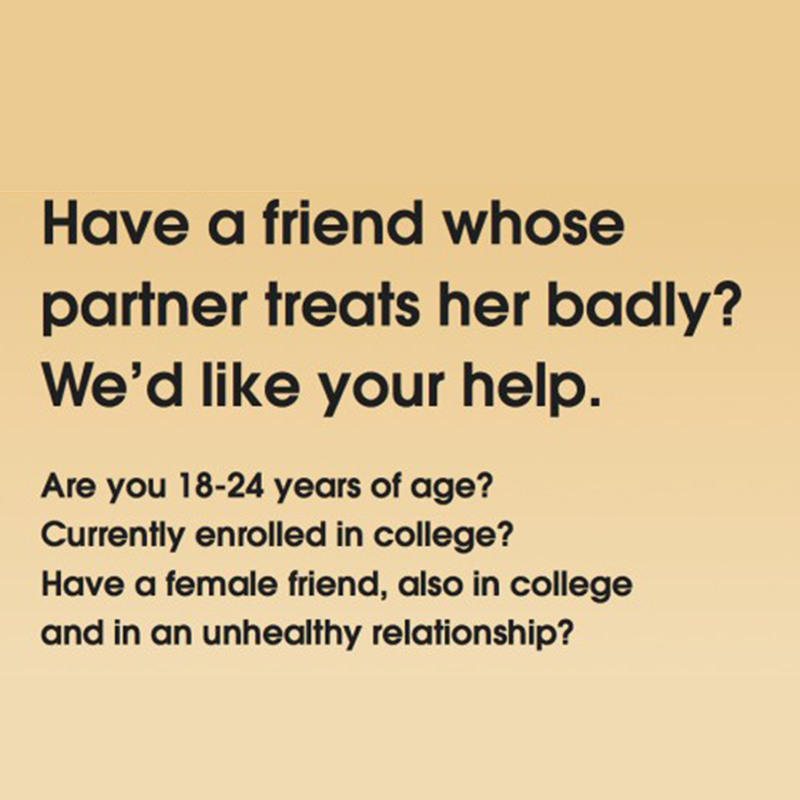Senior Research Assistant Jamie Barnes-Hoyt from the Johns Hopkins University is looking for college students between the ages of 18-24 who have a female friend they think could be in an unhealthy relationship. If you or someone you care about is in a potentially dangerous relationship, you may want to take a minute to learn about it!

The survey is part of a larger effort by JHU researchers Dr. Nancy Glass and Dr. Jackie Campbell to gather data on bystander intervention and the ability of survivors to safely seek help leaving an abusive relationship. Barnes-Hoyt says the barriers to intervention can be legion in the context of any relationship, but the nuances facing young adults are worrisome.
“For college-aged women, it’s sort of a completely different world,” Barnes-Hoyt said. “When we look at the college student population, this is kind of an isolated world.” Barnes-Hoyt said the campus bubble amplifies the challenges that face would-be active bystanders and survivors of any age. “Maybe they both live in the same dorm. Or the friend that’s trying to intervene shares the same social groups,” Barnes-Hoyt said.
Factors like living in close quarters, still depending on a parent or guardian’s health insurance, or a fear of increased violence can create new barriers – not only for the survivor – but also for the friend who would have stepped in. Many people want to help their friend, but they don’t want to hurt their friend.
“There’s not a whole lot of information out there about bystander intervention for this group,” Barnes-Hoyt said. However, the JHU researchers have been working to change that.
Over the next six to eight weeks, the research group is looking for 100 students to participate in a web-based survey designed to evaluate what’s working and what isn’t in safely leaving a violent dating situation or intervening in one. This is one part of a much longer and broader research effort that will engage 700 students nationally around these same questions beginning next year.
The Johns Hopkins School of Nursing previously collaborated with the One Love Foundation to create a web and mobile application that allows bystanders and survivors to take a “danger assessment,” giving users the ability to create a customized safety plan. The app gives survivors and friends of survivors the ability to seek out resources or evaluate the severity of the relationship without going to someone in person, whether because of an inability to, or because of privacy or stigma concerns. This initial survey process will help the team evaluate how the app is working, and what other tools bystanders and survivors need to feel they can safely neutralize a dangerous dating situation.
The One Love Foundation began in 2010 in direct response to the murder of University of Virginia student Yeardley Love, just weeks before her graduation. George Huguely V, also a student at UVA at the time, was sentenced to 23 years in prison for the murder of his ex-girlfriend. Now, the organization, in collaboration with the Johns Hopkins University is exploring new ways to increase active bystanding, and reduce intimate partner violence.
To be a part of this confidential study, e-mail [email protected] or call 1-888-822-5799. Learn more about the OneLove My Plan App and the OneLove Danger Assessment App at JoinOneLove.org/be1forchange.

